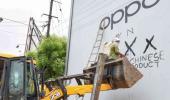A hot sale of a Chinese product, whether assembled in India or anywhere else in the world, may make the country of origin rule fall by the wayside.
Moreover, its execution is challenging for businesses as there are no clear guidelines or definitions from the authorities on what constitutes 'country of origin'.

In a few days, a Shenzhen-headquartered smartphone major is expected to fire up the Indian e-commerce scene, going by history.
Online marketplace giants have announced plans to make the launch of the latest device a success that may indicate recovery in demand during the extraordinary Covid slowdown.
It could be a mere coincidence that the latest smartphone by a Chinese company, founded less than seven years ago, will hit the Indian market at a time when anti-China movement has peaked in the country.
If despite the prevailing nationalistic spirit, buyers go all out to snap up the latest phone, the lack of reason in China bashing (including banning of popular apps such as TikTok and keeping prominent telecom equipment makers like Huawei and ZTE out of the ambit of tenders and auctions) will stand out.
Also, the party around the latest smartphone from a Chinese brand coincides with the government asking e-commerce firms to mention the country of origin for every product sold online.
With that diktat on country of origin, the government has tied itself in knots.
For instance, a hot sale of a Chinese product, whether assembled in India or anywhere else in the world, may make the country of origin rule fall by the wayside.
That’s not the only reason why the rule, specifically meant for e-commerce platforms, may fumble.
While the idea behind such a directive was to block certain goods (read “made in China”) without saying it in those many words, its execution is challenging for businesses as there are no clear guidelines or definitions from the authorities on what constitutes “country of origin”.
Let’s begin with the definition.
Is the country of origin the same as the country of manufacturing?
Or is it the country of assembling the product though its parts are imported?
What if the product is designed, owned and patented in one country, but is made in another country for cost efficiency?
There are many such questions, to which nobody seems to have an answer.
Indeed, under the Legal Metrology (Packaged Commodities) Rules, 2011, there’s a provision for declaring the country of origin, as the Centre rightly told the Delhi high court in an affidavit on Wednesday.
However, this applies to only imported packaged goods.
Certain categories, including furniture, cannot be covered under the rules and therefore it would be legally untenable to enforce the directive for all products.
Also, if declaration of the country of origin is made mandatory for products online, it should be the same for those sold in physical stores as well.
Marking the country of origin for millions of products will take up to one year, estimates suggest.
To get a sense of the scale, the Indian marketplace platforms owned by American majors Walmart and Amazon have around 200 million products each.
So, in the midst of Covid and lockdown stress, e-commerce companies have now got an additional task to interpret the origin of each and every product and label them accordingly.
That’s bad timing when a large chunk of the population is still working from home.
There’s another hurdle. For conventional e-commerce firms, it would have been easier to handle the logistics of the country of origin rule.
However, the onus will be on sellers for marketplace firms like Amazon and Walmart, which holds a majority stake in Flipkart.
Amazon, for instance, hosts more than 600,000 sellers on its India platform.
It’s those sellers who have to ensure compliance.
While there’s a mix of big and small sellers on the e-commerce platforms, a large majority of them are micro, small and medium enterprises (MSMEs) - a category of business that the government is focused on in terms of financial stimulus during the slowdown as well as helping them scale up.
If they have to mandatorily spend time and resources on adhering to such directives at short notice, MSMEs may see the e-commerce platforms as a disadvantage for their business.
On the other hand, such a move would adversely impact the Digital India plans of this government.
It’s important for regulation to keep pace with technology, but they should not scuttle businesses, while bringing in new rules without much thought.
More so when companies are trying to bounce back to pre-Covid levels.
E-commerce is one of the sectors to show green shoots earlier than others; let’s not spoil the party.
Instead, the effort should be to help the sector get back to business as usual.
Photograph: Beawiharta/Reuters












 © 2025
© 2025